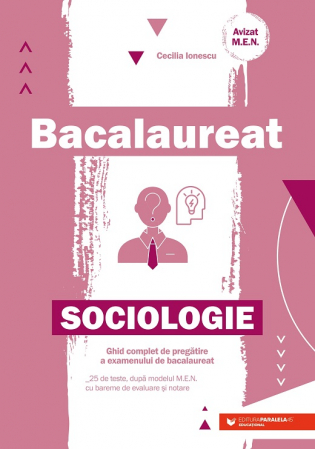Manuscript proposals: [email protected] / 0745 204 115 //// Tracking orders Individuals / Sales: 0745 200 357 / Orders Legal entities: 0721 722 783
6359.png) Leadership and organizational behavior. Course notes for the use of master's students - Elena Oliviana Epurescu
Leadership and organizational behavior. Course notes for the use of master's students - Elena Oliviana Epurescu
6359.png)
Publisher: Editura Universitară
Author: Elena Oliviana Epurescu
Edition: I
Pages: 142
Publisher year: 2023
ISBN: 978-606-28-1688-9
DOI: 10.5682/9786062816889
Product Code:
9786062816889
Do you need help?
0745 200 357
- Description
- Download (1)
- Authors
- Content
- More details
- Reviews (0)
The book Leadership and organizational behavior aims to discuss a series of current topics. Going through the material, we try to answer questions such as: What is leadership? What leadership style suits me? What communication skills are necessary for a leader? Is the workplace like a family?! When do conflicts occur and how can we manage, prevent, anticipate them? Can negotiation be a way to resolve conflicts? Where does the love of power lead? Is corruption a debated problem worldwide? How can we fight against corruption? Does humanity need leaders or heroes? Is being a manager enough to lead an organization? What is the role of the leader in an organization? Do we need an organizational culture? What about an entrepreneurial culture? What strategies can we use? What are the priorities? How can stress and lack of time be managed? How can risk and crisis be overcome in an organization? Can emotional intelligence be the key to success?
-
Leadership and organizational behavior. Course notes for the use of master's students
Download
ELENA OLIVIANA EPURESCU
FOREWORD / 7
INTRODUCTION / 9
CHAPTER I. LEADERSHIP AND ORGANIZATIONAL BEHAVIOR / 15
1. Conceptual boundaries - administration, management, leadership, management, entrepreneurship / 16
2. Leadership styles / 20
Applications / 24
Bibliography / 24
CHAPTER II. COMMUNICATION IN LEADERSHIP / 26
1. Communication strategies / 27
2. Contractual relations vs covenant type relations / 30
3. Some practical methods of communication in concrete situations / 30
4. The DISC / 32 communication model
Applications / 39
Bibliography / 40
CHAPTER III. CONFLICT AND NEGOTIATION / 42
1. Who attacks, who avoids? / 43
2. Conflict management / 47
3. The main methods of nonviolent conflict resolution: mediation, arbitration and negotiation / 49
4. Negotiation styles / 52
Applications / 61
Bibliography / 61
CHAPTER IV. POWER - ADDICTION TO POWER - CORRUPTION / 62
1. Power / 63
2. Me, corrupt? / 65
3. Quotes about power / 68
Applications / 70
Bibliography / 70
CHAPTER V. LEADERSHIP STRATEGY / 71
1. Introduction / 72
2. Analysis tools and techniques / 72
3. Stages of the strategic management process / 76
Applications / 77
Bibliography / 78
CHAPTER VI. ENTREPRENEURIAL CULTURE / 80
1. Discover the entrepreneur in leader / 81
2. Myths about entrepreneurs / 85
3. Benchmarking / 87
Applications / 90
Bibliography / 90
CHAPTER VII. LEADER COACH / 91
1. The coach leader / 92
2. Coaching / 94
3. Emotional intelligence in leadership / 98
Applications / 106
Bibliography / 107
CHAPTER VIII. PRIORITIES - TIME - STRESS IN LEADERSHIP / 109
1. Management of time and priorities / 110
2. Time efficiency techniques and tools / 112
3. Stress management / 116
Applications / 122
Bibliography / 122
CHAPTER IX. THE GROUP AS AN ORGANIZATION / 124
1. The norms of a group / 126
2. Psychology of crowds / 127
3. Johari window / 130
4. Risk/crisis situations in the organization / 132
Applications / 139
Bibliography / 140
INTRODUCTION / 9
CHAPTER I. LEADERSHIP AND ORGANIZATIONAL BEHAVIOR / 15
1. Conceptual boundaries - administration, management, leadership, management, entrepreneurship / 16
2. Leadership styles / 20
Applications / 24
Bibliography / 24
CHAPTER II. COMMUNICATION IN LEADERSHIP / 26
1. Communication strategies / 27
2. Contractual relations vs covenant type relations / 30
3. Some practical methods of communication in concrete situations / 30
4. The DISC / 32 communication model
Applications / 39
Bibliography / 40
CHAPTER III. CONFLICT AND NEGOTIATION / 42
1. Who attacks, who avoids? / 43
2. Conflict management / 47
3. The main methods of nonviolent conflict resolution: mediation, arbitration and negotiation / 49
4. Negotiation styles / 52
Applications / 61
Bibliography / 61
CHAPTER IV. POWER - ADDICTION TO POWER - CORRUPTION / 62
1. Power / 63
2. Me, corrupt? / 65
3. Quotes about power / 68
Applications / 70
Bibliography / 70
CHAPTER V. LEADERSHIP STRATEGY / 71
1. Introduction / 72
2. Analysis tools and techniques / 72
3. Stages of the strategic management process / 76
Applications / 77
Bibliography / 78
CHAPTER VI. ENTREPRENEURIAL CULTURE / 80
1. Discover the entrepreneur in leader / 81
2. Myths about entrepreneurs / 85
3. Benchmarking / 87
Applications / 90
Bibliography / 90
CHAPTER VII. LEADER COACH / 91
1. The coach leader / 92
2. Coaching / 94
3. Emotional intelligence in leadership / 98
Applications / 106
Bibliography / 107
CHAPTER VIII. PRIORITIES - TIME - STRESS IN LEADERSHIP / 109
1. Management of time and priorities / 110
2. Time efficiency techniques and tools / 112
3. Stress management / 116
Applications / 122
Bibliography / 122
CHAPTER IX. THE GROUP AS AN ORGANIZATION / 124
1. The norms of a group / 126
2. Psychology of crowds / 127
3. Johari window / 130
4. Risk/crisis situations in the organization / 132
Applications / 139
Bibliography / 140
Considering that the present material constitutes a course support for the use of master's students, instead of an introduction I will insert the discipline sheet that includes the topics proposed to be studied within the discipline LEADERSHIP and ORGANIZATIONAL BEHAVIOR.
The themes refer to the following aspects: Administration, leadership, leadership management, leadership styles; Power, addiction to power; Corruption; Communication; Conflict and negotiation; Entrepreneurial culture in the organization; Strategic management; Management of priorities, stress, time; Leader coach; Emotional intelligence in leadership; Benchmarking; Group management; Crisis/risk situations in an organization; The group as an organization.
All these come to complete the profile of the manager and the leader, offering varied perspectives in the organizational context.
The course aims to be a support for master's students in deciphering and applying the basic notions specific to the field, the differences, the nuances of certain contexts, managing crisis situations, finding optimal solutions, acting promptly in real life situations, making decisions with a sense of responsibility, delegating tasks, psycho-pedagogical knowledge of those in interaction, creating a favorable, motivating climate within the organization, creating a relaxed atmosphere, working in a team, avoiding, preventing, managing burnout/workaholic situations, reducing stress situations, motivation for obtaining results in the work environment.
At work as in the family?
We will try to answer this question after going through this material and everyone will find the answer and the right way.
The themes refer to the following aspects: Administration, leadership, leadership management, leadership styles; Power, addiction to power; Corruption; Communication; Conflict and negotiation; Entrepreneurial culture in the organization; Strategic management; Management of priorities, stress, time; Leader coach; Emotional intelligence in leadership; Benchmarking; Group management; Crisis/risk situations in an organization; The group as an organization.
All these come to complete the profile of the manager and the leader, offering varied perspectives in the organizational context.
The course aims to be a support for master's students in deciphering and applying the basic notions specific to the field, the differences, the nuances of certain contexts, managing crisis situations, finding optimal solutions, acting promptly in real life situations, making decisions with a sense of responsibility, delegating tasks, psycho-pedagogical knowledge of those in interaction, creating a favorable, motivating climate within the organization, creating a relaxed atmosphere, working in a team, avoiding, preventing, managing burnout/workaholic situations, reducing stress situations, motivation for obtaining results in the work environment.
At work as in the family?
We will try to answer this question after going through this material and everyone will find the answer and the right way.
If you want to express your opinion about this product you can add a review.
write a review

![Leadership and organizational behavior. Course notes for the use of master's students - Elena Oliviana Epurescu [1] Leadership and organizational behavior. Course notes for the use of master's students - Elena Oliviana Epurescu [1]](https://gomagcdn.ro/domains/editurauniversitara.ro/files/product/large/leadership-si-comportament-organizational-note-de-curs-pentru-uzul-masteranzilor-064397.jpg)














